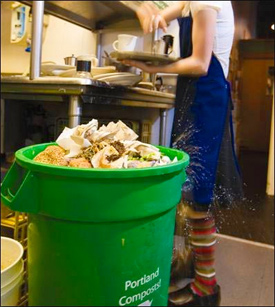Article by Lizzy Caston, from the Edible Portland Magazine
Photo by N. Scott Trimble
How Portland deals with its trash is changing — residentially and commercially. In May 2008, Portland households will receive large blue bins into which residents will throw all recyclables except glass. The city’s commercial food composting program has been in place since 2005. Within the next few years, the program could expand to include households.
It’s bustling during Bijou Café’s brunch service. Tables are full with customers, servers briskly take and deliver orders, and the kitchen is humming — cracking hundreds of eggs, peeling and chopping mountains of vegetables, and dumping buckets of used grounds and paper filters from the coffee makers. By the time the morning rush is over, there is one thing left to deal with — garbage.
This is not an isolated initiative undertaken by Bijou. Nor is it a burdensome labor of love for those who work there. Bijou is participating in a program run by the City of Portland’s Office of Sustainable Development in partnership with Metro Recycling. The program, Portland Composts, reduces reliance on landfills, prevents the need to build new ones, and helps curb the negative effects of methane emitted by rotting food waste.
Started in 2005, Portland Composts has grown in participation from a couple of businesses to close to 200. (View an updated list.) Participants include several big institutions like Portland State University and Oregon Health & Science University, grocery stores like New Seasons Market and Safeway, and large restaurants like McMenamins and Burgerville.
The city’s development of the Portland Composts program makes sense. According to Babe O’Sullivan, the Solid Waste Recycling Coordinator at the Office of Sustainable Development, “more than 75% of waste that goes into landfills comes from businesses…food waste and food-contaminated paper make up nearly 30% of that total.” Translated to the local level, “in Portland alone this equals about 54 tons of food and food-contaminated paper waste per year that can be eliminated from our landfills.”
Portland’s program is modeled on the more established San Francisco version, but the idea of composting food waste is certainly not new. Up until a few decades ago, many homes had no weekly curbside trash service, forcing them to create their own food waste recycling systems. Up until the early part of the 20th century, most businesses dumped their trash on the streets, creating the health hazards that resulted in cities developing public sanitation programs.
Modern regulations practice the “isolate it, seal it, and ship it out” approach to trash removal due to valid disease concerns and vermin issues. That makes it difficult for restaurants and other businesses to implement and maintain their own composting systems. Kathleen Hagberg, owner of Bijou, once tried to run her own composting program at the restaurant and explains it this way: “We are pretty environmentally minded here, so composting seemed like the right thing to do. But without assistance it was messy. Workers didn’t like having to wash out the composting containers everyday, and frankly we had no place to take the food to be composted or a way to haul it ourselves. The city’s program now makes it easy.”
The program is voluntary, meaning that both businesses and garbage haulers need to agree to participate. Not all of the commercial garbage haulers in Portland are currently set up to accommodate food composting, but many are making the switch (such as Cloudburst Recycling and Trashco). Into the indoor compost bins, workers throw leftovers from both kitchen prep work and prepared meals, like fruits, vegetables, and grains. Also acceptable are items that don’t break down well in small home composting systems, but can be handled by large commercial composting operations, such as raw meat, poultry, seafood, shellfish, bones, and cheese. Other items include food-contaminated paper, like napkins, plates, and towels. The plastic bins are emptied into large composting dumpsters, and the compost is collected by garbage haulers on a regular basis.
Commercial composting is not without its challenges. One of the biggest slowdowns to expanding the program is the question of where to haul the large amount of food waste generated. “Currently there is no local composting facility that can handle this amount of food waste. We have to ship it up to Maple Valley in Washington, which causes concerns that we are using quite a bit of fossil fuels in the process, thus negating the environmental benefits of the program,” O’Sullivan explains.
Without a local facility large enough to handle the waste, the program is unsustainable.
In the meantime, food composting is filtering down to the residential level. According to Portland’s new waste prevention and recycling plan, residents will be receiving yard debris roll carts within the next year, which will eventually include the collection of food waste. This new plan could stimulate enough interest to secure a local composting facility. If so, home and business composting would become as standard as recycling. Remember, until recently recycling was all but unheard of, and now it’s as easy as taking out the trash.
Lizzy Caston is a writer, urban planner, and business consultant. She shares her small northeast Portland home with her dog, Mabel, and three lovely hens: Flossie, Fiona, and Fidget.

